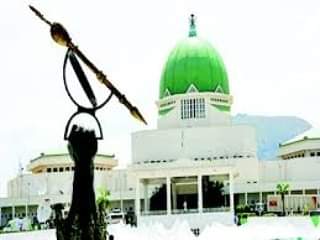
…The Deputy Speaker of the House of Representatives, Rt Hon IIdris Ease who doubled as the chairman, House of Representatives’ Special Ad-hoc Committee on the review of the 1999 Constitution, Hon. Idris Wase on Wednesday formally laid the report/recommendations on the Constitution review for further legislative action.
Members are expected to commence debate and vote on the recommendations next Wednesday and Thursday, as announced by the Speaker, Hon. Femi Gbajabiamila on Tuesday.
According to the Deputy Speaker, the report include: bills which seek to abrogate the State Joint Local Government Account and Provide for a Special Account into which shall be paid all Allocations due to Local Government Councils from the Federation Account and from the Government of the State; as well as establish Local Government as a tier of government and guarantee their democratic existence, tenure and bill seeking to provide for the financial independence of State Houses of Assembly and State Judiciary and for related matters.

The lawmakers are expected to vote on the Special Ad-hoc Committee recommendations on the bills from next week Wednesday which seek to Establish State Security Council; Empower the National Assembly and State Houses of Assembly Powers to summon the President of the Federal Republic of Nigeria and Governors of States to answer Questions on issues on which the National and State Houses of Assembly have the Power to make law; reduce the period within which the President or the Governor of a State may authorize the withdrawal of Monies from the Consolidated Revenue Fund in the absence of an Appropriations Act from six months to three months; Replace the Consolidated Revenue Fund of the Federation with the Consolidated Revenue Fund of the Federal Government; and Establish the Office of the Accountant –General of the Federal Government separate from the Office of the Accountant –General of the Federation.
The House also received reports on the bills which seek to ‘Empower the Revenue Mobilization Allocation and Fiscal Commission to enforce compliance with remittance of accruals into and disbursement of revenue from the Federation Account and streamline the procedure for reviewing the revenue allocation formula; Expand Immunity to the Legislative and Judicial Arms of Government; Specify the period within which the President or the Governor of State shall present the Appropriation Bill before the National Assembly or House of Assembly require the President or Governors to submit the Names of Persons Nominated as Ministers or Commissioners within 30 days of taking the Oath of Office for Confirmation by the Senate or State House of Assembly; and include Presiding Officers of the National Assembly in the Membership of the National Security Council.
Other reports include bills which seeks to “compel persons to obey or comply with Legislative Summons”; ‘Regulate the First Session and Inauguration of Members-Elect of the National and State Houses of Assembly’; Institutionalize Legislative bureaucracy in the Constitution; provide for the procedure for passing a Constitution Alteration Bill where the President withhold assent’; as well as bill which seeks to provide the procedure for overriding Executive Veto in respect of Money Bill.
In the same vein, members are expected to vote on the bills which seek to: Provide for the Procedure of Removing Presiding Officers of the Legislature; Provide Pension for Presiding Officers of the National Assembly; Establish the Federal Revenue Court and the Revenue Court of a State; Further strengthen the Judiciary for timely dispensation of justice; Provide the timelines within which Civil and Criminal Cases are heard and determined at Trial and Appellate Courts in Order to eliminate unnecessary delay in justice administration and delivery.
The lawmakers are also expected to vote on the Special Ad-hoc Committee on Constitution Review on the bills which seek to Ensure uniformity in the retirement age and pension rights of Judicial Officers of Superior Courts of Records; Delete the reference to the provisions of the Criminal Code, Penal Code, Criminal Procedure Act, Criminal Procedure Code or Evidence Act; Exclude the period of intervening events in the computation of time for determining pre-election petitions, Election petitions and Appeals therefrom; and bill which seeks to allow Court or Tribunal proceedings to be conducted remotely, virtually, online or through any Media platform or technological Innovation.
The lawmakers also laid the reports on the bills which seek to ‘Expand the Interpretation of Judicial Office to include Courts or Tribunals created by an Act of the National Assembly or a State House of Assembly; Provide for the Post Call Qualification of the Secretary of the National Judicial Council; Permit Public Servants to engage in healthcare education, production and services beyond farming; Impose the requirement of fair hearing in the process of Recommendation of Removal of Judicial Officers by the State Judicial Service Commission; Include Judges of the National Industrial Court in the Composition of Election Tribunal; Move Airports from Exclusive Legislative List to the Concurrent Legislative List and move Fingerprints, Identification and Criminal Records from the Exclusive Legislative List to the Concurrent Legislative List.
The Special Ad-hoc Committee also laid the report on the bills which seek to Delete prisons in the Exclusive Legislative List and re-designate it as Correctional Services in the Concurrent Legislative List; move Railway from the Exclusive Legislative List to Concurrent Legislative List; allow States generate, transmit and distribute electricity in Area covered by the National Grid; and Alter Part I of the Second Schedule to the Constitution of the Federal Republic of Nigeria, 1999 to include Value Added Tax on the Exclusive Legislative List.
In the same vein, the House received the reports on the bills which seek to Provide for Special Seat for Women in the National and State Houses of Assembly; Expand the Scope of Citizenship by Registration; Provide for Affirmative Action for Women in Political Party Administration; provide Criteria for Qualification to become an Indigene of a State in Nigeria; Enhance the Independence of Certain Bodies; Remove Transitional Lawmaking Powers from the Executive Arms of Government; Specify the Time within which the Executive shall present to the National Assembly any Treaty between the Federation and any other Country for Enactment.
Others include bills which seek to: Establish the Office of the Attorney–General of the Federation and of the State separate from the Office of the Minister of Justice or Commissioners for Justice of the state in order to make the Offices Attorneys–General Independent and Insulated from Partisanship; Provide for a State of the Nation and State of the State Address by the President and Governor; Include Former Heads of the National Assembly in the Council of State; and Provide for the termination of tenure of certain elected officials on account of a change of political party.
In line with Section 9(2) of the Constitution (as amended), the resolution of the National Assembly on the alteration of the Constitution is expected to be transmitted to the State Houses of Assembly.
Section 9(2) of the 1999 Constitution (as amended) provides that: “An Act of the National Assembly for the alteration of this Constitution, not being an Act to which section 8 of this Constitution applies, shall not be passed in either House of the National Assembly unless the proposal is supported by the votes of not less than two-thirds majority of all the members of that House and approved by resolution of the Houses of Assembly of not less than two-thirds of all the States.”
END
